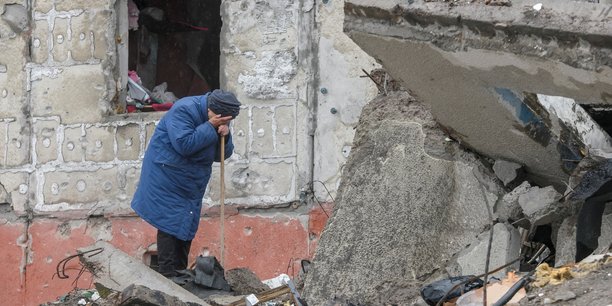
The World Bank has just wiped out all already very pessimistic economic forecasts over the past month about Ukraine’s economic health following the Russian invasion.
A month ago, the International Monetary Fund (IMF) forecast a GDP decline of between 10% and 35%, and less than two weeks ago (March 31), the European Bank for Reconstruction and Development (BERD) forecast a 20% decline.
† Read: 18 years of development erased: the extreme scenario of the Ukrainian economy
Ukraine’s GDP collapse by 45.1% by 2022
Yesterday Sunday, the World Bank announced a catastrophic collapse and forecast that Ukraine’s GDP would fall by 45.1% by 2022, while Russia would see its GDP fall by 11.2%.
Since the start of this war, which began on February 24 by Russia, more than four million Ukrainians have left the country, fleeing to Poland, Romania and Moldova, and the prices of food such as energy have continued to rise.
The situation in Ukraine has been hit hard by declining government tax revenues, as businesses are closed or only partially operational, while trade in goods is severely disrupted. Grain export has become impossible “in large parts of the country due to heavy damage to infrastructure”, for example, Anna Bjerde, the vice president of the World Bank in charge of this region, noted during a conference call.
In fact, the World Bank has calculated the impact of this conflict on the entire region.
GDP in Eastern Europe would fall by -30.7%
In Eastern Europe alone, GDP is expected to fall by 30.7%, compared to a projected growth of 1.4% before the invasion. This calculation takes into account the impact of the sanctions imposed on Belarus, an ally of Russia, on its role in the war. Not to mention that this part of Europe relies on natural gas to meet its energy needs.
In detail, Moldova could become one of the countries hardest hit by the conflict, not only because of its geographic proximity to the war, but also because of its inherent vulnerabilities as a small economy closely linked to the two countries, Ukraine and Russia. .
A recession worse than the one caused by the Covid pandemic
More broadly, the Washington institution is announcing that it expects GDP to contract by 4.1% this year for all emerging and developing countries in Europe and Central Asia, while it expected 3% growth before the war. It is also much worse than the recession caused by the 2020 pandemic (-1.9%).
And as the toll of human and material destruction continues to mount and a massive Russian offensive is in preparation, the institution explains that when preparing its forecasts, the Bank has assumed that the war will continue for “a few more months”.
The even darker scenario envisioned by the World Bank
But she warns of an even bleaker scenario if the conflict stalls.
“The results of our analysis are very bleak,” Anna Bjerde, World Bank vice president responsible for the region, said during a conference call.
She added:
“This is the second major shock to the regional economy in two years and it comes at a very precarious time as many economies still struggled to recover from the pandemic. †
This manager from the World Bank acknowledges that these latest forecasts are subject to “great uncertainty” with an unknown, the real impact of the war in the eurozone.
Therefore, the institution has therefore also considered a more pessimistic scenario taking into account a stronger impact on the eurozone, an escalation of sanctions and a shock to financial confidence.
This is essentially what the regulatory authorities said a week ago, which have been closely monitoring the situation of European banks since the start of the conflict in Ukraine and the implementation of sanctions against Russia. Their message was optimistic, but only for the short term: For now, they said, the banks’ exposure to Russian risk is generally limited, but the war should not drag on for too long.
A worse scenario than the 2008 financial crisis
However, in this darker scenario of a protracted war, the World Bank has calculated that: the region’s GDP would then contract by almost 9%far more than the 5% suffered during the global financial crisis of 2009 and more than the 2% recession caused by the pandemic in 2020, the World Bank recalls.
For the Russiathe 2022 plunge would no longer be -11.2%, mentioned earlier in this article, but would be -20%. For Ukraineit would fall by -45.1% at -75%.
(with AFP)



